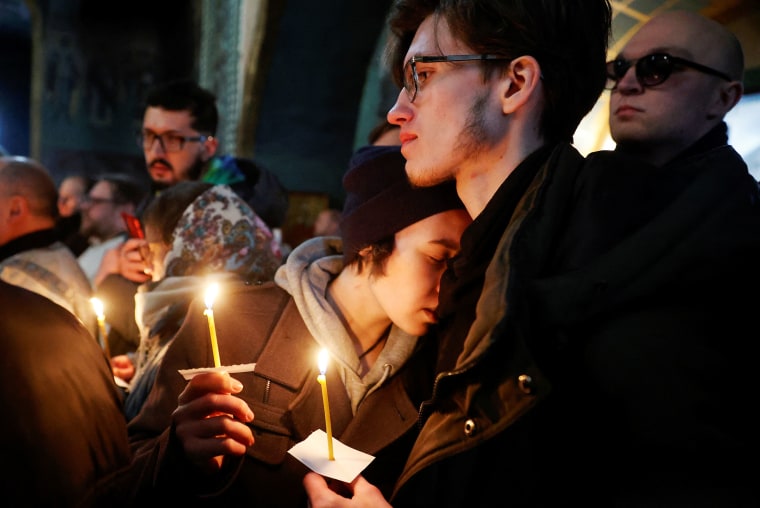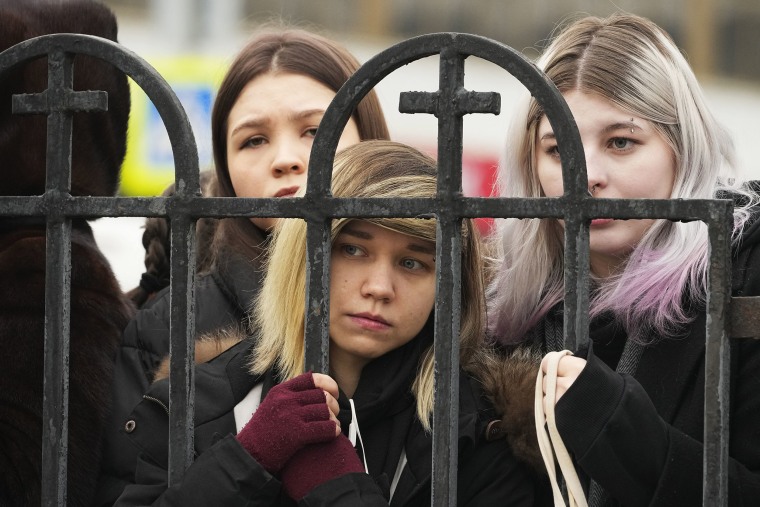For one day at least, Russia’s opposition came alive to mourn its lost leader.
The funeral of Alexei Navalny on Friday almost did not happen at all. But thousands ultimately turned out — braving the snow, heavy security and weeks of Kremlin efforts to derail the event — so that they could pay their respects to the man who challenged President Vladimir Putin with a vision for a democratic Russia.
Bearing flowers, candles and placards, the crowd chanted Navalny’s name as his body was first delivered to a church in southern Moscow for a brief funeral and then to a nearby cemetery.
There were also riskier words uttered in a country where the state crushes even modest displays of dissent. “Russia without Putin!” “Russia will be free!” and even “Putin is a murderer!” were all audible cries from the clamorous masses.

Navalny’s supporters say he was poisoned on Putin’s instruction, a charge the Kremlin denies.
The funeral was viewed around the world, with a YouTube livestream set up so that those who saw hope in Navalny’s struggle could follow the event online. Earlier in the day, Kremlin spokesman Dmitry Peskov gave “a reminder” to those taking part: “Any unsanctioned gathering” would be punished.
As such, there was a heavy security presence at the event, including police stationed on rooftops and guarding Navalny’s old house nearby. Opposition media reports suggested that at least two people had been detained during the event and, in the past, Russian intelligence services have used surveillance footage to track down protesters and punish them after the fact.
Navalny’s death and the ensuing crackdown shows “an absolute panic on Putin’s side,” said Bill Browder, an American businessman turned arch Kremlin critic. Despite the president’s almost certain victory in an election two weeks away, Browder believes that “Putin is clearly feeling scared in advance of this so-called election — which isn’t really an election” and that his tactics are “just pure repression at this point to keep people in line.”

The day was also tinged with the geopolitical tension between Moscow and the West, with a crowd of diplomats, including U.S. Ambassador to Russia Lynne M. Tracy, in attendance a day after Putin reiterated his threats of nuclear war.
Navalny “remains a shining example of what Russia could and should be,” the U.S. Embassy said in a post on X. “His death is a tragic reminder of the lengths the Kremlin will go to silence its critics.”
And in a nod to Russia’s ongoing war in Ukraine, which Navalny opposed, some of the crowd chanted, “No to war!” It’s difficult to gauge public opinion in Russia given the crackdown on dissent, but polls suggest war opponents are still in the minority and the Kremlin has been able to boast of battlefield advances in recent weeks.
Before today, around 400 people were arrested for simply laying flowers at Navalny memorials nationwide following his Feb. 16 death in an Arctic penal colony. That was a deliberate Kremlin tactic to dissuade mourners from attending his funeral, according to Browder, author of “Red Notice: A True Story of Corruption, Murder and how I became Putin’s no. 1 enemy.” That intimidation made their defiance Friday doubly remarkable, he said.
“That you had several kilometers of people bravely coming out to honor his memory, I think, was a surprise for everybody, because all of them were taking extreme risks,” he said. “For every person who is on the street showing their face, there are probably 100 or 1,000 more back home who are scared but still outraged.”











